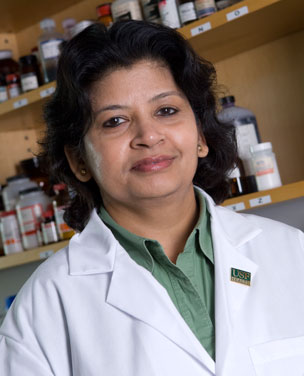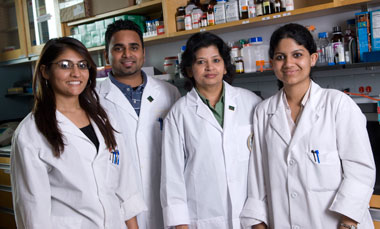Molecular Medicine team adds expert on tumor cells
A tumor cell interacts with the environment around it, urging nearby cells to mutate and causing them to become inflamed, two actions that help a tumor grow.
Knowing how tumor cells initiate these changes is the basis of current cancer research the world over because knowing this could mean direct, dramatic strategies for drug delivery.
Subhra Mohapatra, PhD, recently joined USF’s Department of Molecular Medicine with the specific charge of finding these answers, narrowing in on prostate cancer as a model. Her work is adding to the core research infrastructure being built by Robert Deschenes, PhD, who became chair of the department last January.

Subhra Mohapatra, PhD
“I’m excited to be a part of the team Dr. Deschenes is building,” Dr. Mohapatra said. “My expertise is complementary to the work being done in this department.”
Her work is garnering attention, including publications in several journals and federally funded research grants.
Most recently, she was one of four USF researchers to earn biomedical grants from the Florida Department of Health to study tobacco-related diseases, including cancer. Dr. Mohapatra’s two-year project, titled “Nanohole Sensor-Based Detection Technology for Cutaneous Metastatic Melanoma, earned $621,696.
While Dr. Mohapatra is narrowing her research to prostate cancer, the signaling among tumor cells in prostate cancer is similar in other tumor environments, including breast, melanoma, lung, and ovarian, she said.
“This deeper interest will help in knowing how to attack for therapy and design therapeutics for multiple cancers,” she said.
In prostate cancer, its growth involves both gene mutations and exposure to an inflammatory tissue microenvironment. Dr. Mohapatra and her team will model these interactions using inhibitors of a cardiac hormone receptor known to progress cancer, natriuretic peptide receptor A (NPRA), in cultured cells and in a mouse model.

Part of Dr. Mohapatra’s lab team are, from left, Kejal Patel, MS; Ronil Patel, MS; Dr. Mohapatra; and a former intern Pallavi Mohapatra. Three other lab members not pictured are Xiaoqin Wang, MD, PhD, (post doc), Yvovnne Davis, and Vikas Sharma.
“We recently demonstrated that cancer cells express more NPRA than do normal cells,” she said. “Moreover, NPRA deficiency substantially protects mice from developing tumors. The mechanisms by which NPRA supports tumorigenesis, however, are still not clear. Our current research is aimed at testing the hypothesis that NPRA signaling plays an important role in tumor-stroma (microenvironment) interactions via regulation of key inflammatory cytokines involved in the pathogenesis of prostate cancer.”
The mouse models that are capable of developing prostate cancer are being used to study the role of NPRA in prostate cancer progression. In addition, Dr. Mohapatra is interested in developing strategies for drug delivery that targets prostate cancer cells using tissue- or cell-targeted nanoparticle technology, thereby eliminating unnecessary toxicity associated with systemic drug delivery.
“Our demonstration that NPRA is overexpressed in prostate cancer cells has prompted us to develop a ‘prostate cancer theranostics,’ which is a fusion of prognostic (by imaging) and therapeutic approaches that will aid in tracking the effectiveness of prostate cancer treatment regimens and allow non-invasive detection of cancer during treatment, without sacrificing experimental animals,” Dr. Mohapatra said.
In tandem with her work on understanding the tumor growth mechanisms for prostate cancer, Dr. Mohapatra is studying how two common, natural products might act as possible cancer treatments.
Curcumin (an Indian curry spice) and genistein (a soy isoflavone) have both demonstrated anti-inflammatory and anti-cancer effects in clinical studies, but their potential use for prostate cancer prevention or treatment has been severely limited due to their poor bioavailability.
“We are attempting to increase solubility and bioavailability and to develop targeted delivery of these products to specific cancer cells,” Dr. Mohapatra said. “In order to pursue this strategy, we are collaborating with Transgenex Nanobiotech, Inc., which has developed novel nanoparticles for targeted delivery of small molecules, such as curcumin and genistein, to increase their solubility and stability.”
Dr. Mohapatra has found that chitosan-cyclodextrin-curcumin (3C) complexes significantly increase cursumin’s half-life in biological media with serum.
“We also plan to examine the potential of prostate cell-specific delivery of 3C nanoparticles coupled to peptide or antibodies against prostate stem cell antigen,” she said. “Successful targeting of nanocomplexes, which should improve the bioavailability of these natural antitumor agents with proven safety records, is expected to lead to new therapeutics for prostate cancer and other cancers.”
Story by Sarah A. Worth, USF Health Communications
Photos by Eric Younghans, USF Health Communications

